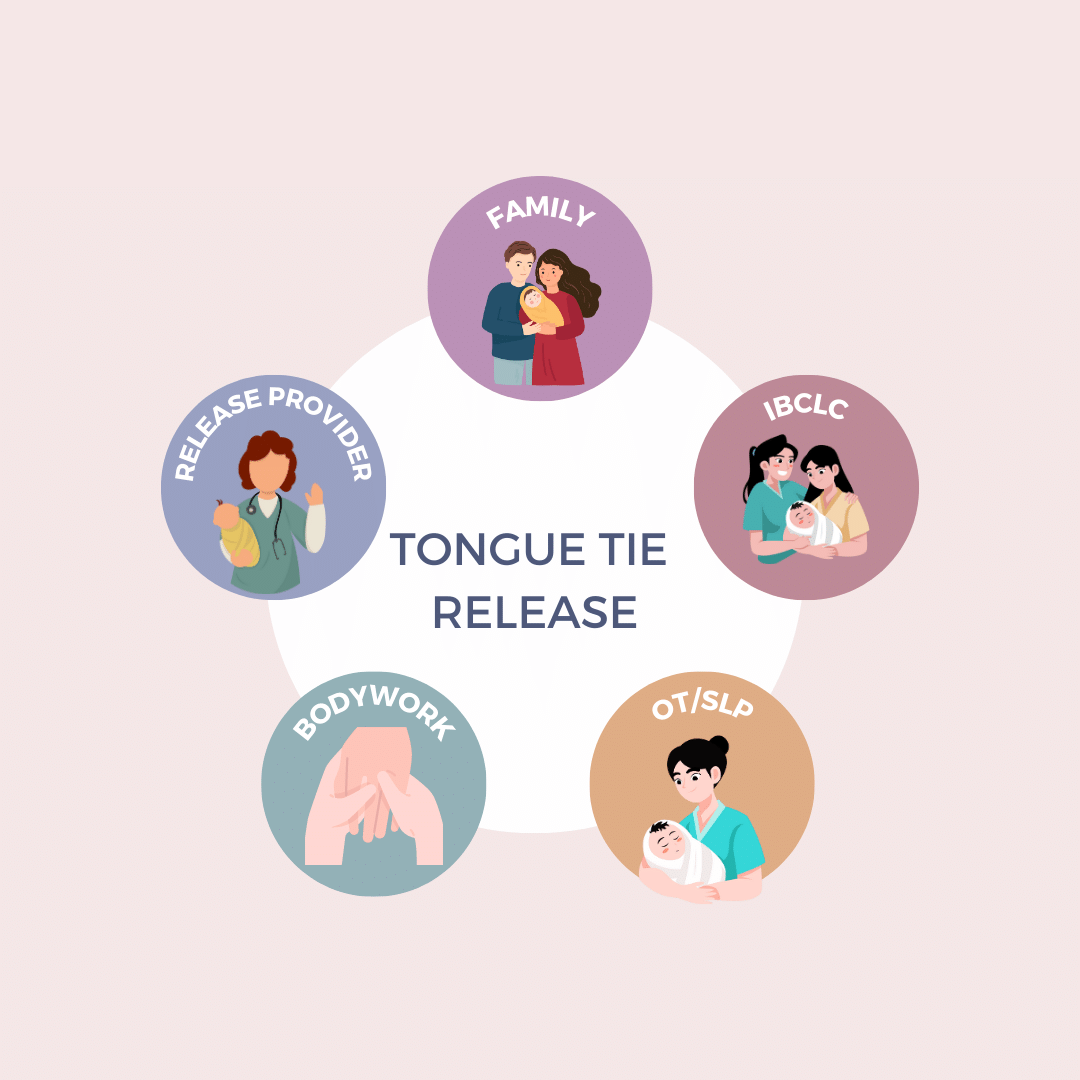Tongue Tie Release: Oral Tie Surgery, Therapy, and Specialists (2024)
Tongue Tie Treatment
Infants with tongue tie (ankyloglossia) often have difficulty breastfeeding or even bottle feeding, which can lead to a range of issues such as poor weight gain, reflux, excessive gas and discomfort with feeds. In these cases, it’s important to find providers who specialize in treating infant tongue ties. In this post I will discuss the tongue tie release and the team that provides support pre and post frenectomy. But first, what is a tongue tie?
What is a Tongue Tie and How does it affect Babies?
Tongue tie is a condition that can affect infants, occurring when the lingual frenulum (the tissue connecting the tongue to the floor of the mouth) is unusually tight or short. This restricts the tongue's movement, potentially leading to breast or bottlefeeding challenges. There are many signs of tongue tie that you may not realize are connected. You may have painful, slow or difficult feeds. Your baby may click at the breast, be gassy or fussy. Learn more about the signs and symptoms of tongue tie below.
Does My Baby Have a Tongue Tie?
If you suspect a tongue or lip tie, the first step is to get a functional assessment, by an occupational therapist, speech therapist, or lactation consultant skilled in the treatment of infant ankyloglossia. I am a multi-credentialed therapist (IBCLC, OT, & CST provider) and offer several services in house. Learn more about me below.
Tongue Tie Surgery Procedure
Infant tongue tie surgery, also known as frenectomy, is a straightforward procedure performed to release the restrictive tissue, allowing the tongue to move more freely. This improved range of motion can improve the quality and efficiency of feeds. Families dealing with tongue tie greatly benefit from support through the release process. The support team can help you evaluate optimal timing of a release, help you and your baby prepare for the procedure, and support oral motor function and good healing.
Tongue Tie Treatment and Therapy
Parents managing dealing with tongue-tie are often confused tongue tie therapies are right for their baby. While occupational therapy (OTs) and speech and language pathologists (SLPs) are excellent for feeding problems, bodyworkers such as osteopaths, physical therapists, and chiropractors can also play a crucial role in the care of oral ties. The release provider and family are key players. There are a lot of different providers that work with infants with tongue ties. In this article, I will discuss different professionals and their roles in addressing oral ties.
Who is on Team Tongue Tie?
I’ve seen a lot of questions about who parents should see when treating ties and considering a release. There is overlap in the roles that providers play, the key is to find a provider who is well versed in oral ties in babies. The best provider in your community may be different than in another. It’s important to find skilled oral tie care, and understand that there can be overlap in roles.
The Family
The family plays a crucial role in the treatment of infant tongue ties. As the primary caregiver, parents must be aware of the signs and symptoms of tongue-tie, including difficulties in breastfeeding or bottle feeding, reflux, excessive gas, and discomfort during feeding. If parents suspect that their infant has a tongue-tie, they should seek an evaluation from a qualified professional. Additionally, parents should communicate openly and regularly with the provider team to ensure that they are aware of any concerns, changes, or progress in their child's condition. Parents can also help their child by performing pre and post-operative stretches and exercises, which can help to prevent reattachment and scarring, and promote neuromuscular re-education. By working together with providers and actively participating in their child's treatment, parents can help support the best possible outcome for their child.
Lactation Consultant
If breastfeeding is an issue, an International Board Certified Lactation Consultant (IBCLC) is the best professional to consult for the mother and baby. An IBCLC can help with a variety of goals, including latch, milk supply, body positioning, maternal pain, reducing nipple damage, feeding progression, caloric volume, safety, weaning, and overall optimal health as it relates to breastfeeding.
Nurture and Nourish offers virtual tie support to help you achieve your infant feeding goals. Book a virtual visit today and get the help you need right away!
Functional Therapist (OT / SLP)
Occupational Therapists (OTs) and and speech and language pathologists (SLPs) are therapists who can help with feeding and oral function. Many OTs and SLPs who work with oral ties (buccal, labial, and lingual ties), some can help with breast and bottle feeding. Functional therapists like OTs, SLPs, and PTs will recommend oral motor exercises, like suck training. If your baby is moving their tongue actively, this is a functional exercise / oral motor exercise.
It's important to note that not all OTs (or SLPs) are well-versed in oral ties or have training specific to infants, so parents should make sure their therapists/bodyworkers have infant specific tongue tie training. Some therapists provide myofunctional therapy, this is a helpful therapy for kids 3 and up, who can follow directions. If you are looking for help with your baby, it’s important to find therapists who specialize in infants to get the appropriate care. Many online support groups and websites like La Leche League and the International Consortium of Tongue-Tie Professionals (ICAP) can provide referrals.
Bodyworker
Manual therapists, such as physical therapists, occupational therapists, osteopaths, and chiropractors, have a hands-on license to touch. Manual therapist who are trained to work with infants may use craniosacral therapy, myofascial release, and other modalities to address the imbalanced tension. Manual therapists can address the impact fascial tension around muscles and posture/alignment in the whole body and and support the work of lactation.
Release Providers
Release providers play a critical role in the treatment of oral ties. These providers are typically dentists or ear, nose and throat (ENT) specialists who have received specialized training in the diagnosis and treatment of tongue tie. The release provider is responsible for performing the frenectomy procedure to release the tongue tie, which involves using a laser or scissors to cut the tissue. In addition to the procedure itself, the release provider will also provide important post-operative care instructions to parents, such as aftercare stretches to help prevent reattachment and scarring. After care stretches are wound care, these are exercises where the tongue is passively moved by the parent.
Tongue Tie Surgery - Pre and Post Op Care
Pre-operative care by a skilled OT or SLP is crucial in tongue ties, as it helps to reduce stress and discomfort during post-operative care. In an ideal world, no provider would release a tie without pre-operative care.
Functional Pre-release therapy
Pre frenecctomy therapy provides several benefits, such as:
Identifying oral function issues which warrant need for further assessment
recording a baseline of skills so that the parent, release provider, and therapist(s) can assess progress after the release
teaching the parent post-operative stretches in advance so everyone is prepared
Post Release Therapy
Post-frenectomy therapy provides several benefits, such as:
Post-op care is important to prevent reattachment and scarring, and includes aftercare stretches and neuromuscular re-education.
Post op care can include strategies to ease discomfort and aid in feeding post release
to address any residual body tension now that the oral ties have been release
Tongue Tie Stretches and Exercises
It’s important to understand the difference between stretches and exercises as this can get confusing. OTs, SLPs, and PTs are experts in functional oral motor skills. We often recommend tongue exercises like suck training, where the baby is actively moving their tongue. These are oral motor exercises to retrain the tongue to move in a more functional pattern. Release providers typically recommend “stretches”. Stretches are different than the “exercises” that an OT, SLP or PT may give you. They may look like lifting the tongue or the lip.
When following recommendations on oral function its key to get care from professionals who specialize in this area. There is no replacement for having a functional evaluation done by an OT or SLP and having recommendations that are tailored to your unique circumstances.
Tongue Tie Treatment
The effective management of tongue tie-related issues involves a coordinated effort from various healthcare professionals, each contributing their expertise to ensure optimal outcomes. Prior to considering a tongue tie release procedure, an important step is a comprehensive tongue tie functional evaluation conducted by a therapist. This assessment offers a detailed understanding of the functional implications of the condition, informing subsequent treatment decisions.
Within the healthcare team, different specialists play vital roles, ranging from lactation consultants and speech therapists to release providers. These professionals should collaborate to provide a treatment plan tailored to the individual's needs.
By prioritizing a tongue tie functional evaluation and treatment, a family can make a decision on if a release is needed. This approach minimizes unnecessary procedures and enhances the potential for successful outcomes.
In conclusion, the collaboration between healthcare specialists and the expertise of a tongue tie therapist is key in addressing tongue tie-related challenges. A thorough functional evaluation lays the foundation for informed treatment decisions, emphasizing the significance of a well-informed beginning on the path to improved oral health, motor development, comfort, and overall well-being.
Source: TOTs 101 for Parents. Talktools. 2019, September. p. 1-4
Tongue Tie Support
Charleston Tongue Tie Support
Need support through a tongue tie release? I work closely with release providers in the Charleston area.
I offer:
Lactation Support
Tongue Tie Therapy
Craniosacral Therapy
I provide office visits in north Mount Pleasant, in-home visits, and telehealth lactation consults.
Like this content? Check out the Blog Archive for more.
Archive
- Bodywork for Babies
- Bottle feeding
- Breastfeeding
- Charleston, SC
- Craniosacral therapy
- Infant Feeding
- Lactation
- Lactation Consultant
- Milestones
- Mount Pleasant
- Mt Pleasant SC
- Newborns
- Nurture and Nourish Charleston
- Nurture and Nourish Services
- Occupational Therapy
- Tongue-tie
- Whole Body Therapy
- breastmilk







